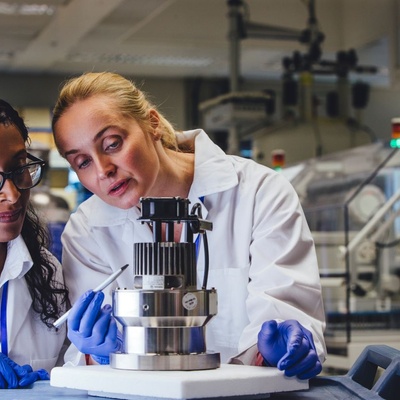The life science industry is a growing field that requires a blend of technical expertise and soft skills. Due to sector expansion, there’s an increasing demand for talented professionals who can adapt to new technologies and market changes. Especially in biotech and pharmaceuticals, specific skills and experiences remain in short supply, with 80% of pharma-manufacturing companies reporting a skills gap in a global report by McKinsey (2022). While these gaps create a wealth of opportunities for ambitious professionals seeking to advance their careers in the industry, to be successful in this competitive landscape isn’t just about possessing the right skills—it’s about knowing how to leverage them effectively.
In this article, we will explore the top transferable skills in high demand within the biotech and pharmaceutical sectors. We will provide insights into what makes candidates stand out, covering a range of competencies from technical proficiencies like automation and systems management to essential soft skills such as effective communication, collaboration, and project management.
What Does the Current Biotechnology and Pharmaceuticals Job Market Look Like?
Last year, the biotech and pharmaceuticals job market was affected by industry-wide layoffs, resulting in workforce reductions across the board. According to data from Fierce Biotech, biopharma layoffs increased by 57% compared to 2022, including prominent names such as Pfizer, Johnson & Johnson, and Novartis. This trend was triggered by several factors, including a downturn in the IPO (initial public offerings) market, lower investments into the industry, and general economic uncertainty. These conditions forced businesses to cut back on costs and, eventually, people. So, how does the biopharma job market look today?
Fortunately, following the setback, the biotech industry is regaining momentum. Many businesses are approaching their workforce strategically and responding to economic changes accordingly. One popular strategy that companies are adopting is contract hiring. Instead of employing permanent staff, which may cause financial issues in the long run, contract hiring allows businesses to adapt to sudden market shifts, creating new job opportunities in the sector. While this development is positive, it also means that competition for these limited roles will be high. Consequently, candidates must identify and develop the transferable skills required to increase their potential when transitioning into the life science industry.
Skills & Experience That Are Transferable to Biotech/Pharma:
Hard Skills in Short Supply
The biopharmaceutical and Fast-Moving Consumer Goods (FMCG) sectors are experiencing a widening skills gap, particularly in engineering roles. This year, the biopharmaceutical industry has made substantial progress in recipe-based production and implementing more sophisticated automated tools. However, this advancement has created a gap between engineers' skill sets and the evolving technological landscape. As a result, engineers with experience in automation and systems management are in high demand across the industry. Here is a list of the most in-demand hard skills:
- Process Control Systems Knowledge: Familiarity with or training in advanced Process Control Systems, such as Siemens Step-7/PCS-7, can significantly increase a candidate's attractiveness in the job market.
- CQV Expertise: Australia is experiencing a notable shortage of engineering professionals capable of conducting Commissioning, Qualification, and Validation (CQV) activities on highly regulated equipment. This scarcity is particularly acute given the stringent regulatory environment in the biopharmaceutical industry. Australia's Therapeutic Goods Administration (TGA) requires rigorous validation of manufacturing processes and equipment, making CQV expertise invaluable.
- Laboratory Techniques: Understanding laboratory techniques is another key asset. It's not just about knowing how to perform techniques but also grasping their purpose and applications. This deeper understanding demonstrates your ability to contribute meaningfully to research and development projects.
- Good Manufacturing Practices (GMP): Experience with Good Manufacturing Practices (GMP) and clean room environments can set you apart from other candidates. These are significant aspects of pharmaceutical production that ensure product quality and safety. Even if you don't have direct experience, familiarity with these concepts can be beneficial.
- Documentation Skills: The ability to update and review Standard Operating Procedures (SOPs), specifications, and other important documents is always in demand.
If you are a prospective biotech engineer or currently on the biotech/pharma industry job hunt, prioritising these hard skills can help you become an ideal candidate.
Soft Skills in Demand
While hard skills provide you with the technical expertise to successfully complete a project, possessing the necessary soft skills is equally important. These essential soft skills are not just constrained to engineers; they can be applied to various roles within the sector. Here is a non-exhaustive list that can serve as a starting point for your professional development:
- Communication: Effective communication is essential for all roles across the life science industry. Engineers are generally proficient communicators, but simplifying complex information for diverse teams is one area for improvement. Excellent written and verbal communication skills are essential for presenting findings and collaborating with colleagues, writing reports, and explaining concepts to non-specialists or researchers outside one's speciality. These skills demonstrate aptitude and versatility.
- Initiative and Willingness to Learn: Due to the dynamic nature of the biotech and pharmaceuticals market, having initiative and a willingness to learn will set you apart from others. This proactive approach and prioritising L&D (Learning and Development) will help you stay relevant and differentiate yourself during the hiring process.
- Project Management Skills: Project management skills are essential for juggling multiple deadlines and budgets. Demonstrating your ability to manage projects effectively shows that you’re a multitasker and can handle the demands of the industry.
- Problem-Solving Skills: Troubleshooting various instruments, conducting risk and root cause analysis, and finding solutions to complex problems are industry-wide problem-solving skills. According to a report by ABPI, 33.3% of companies find problem-solving/critical thinking skills a concern when addressing their talent gap.
- Collaboration Skills: Many industry jobs rely on teamwork. Effective collaboration across different teams and building strong working relationships are essential for success. Strong interpersonal skills will help you navigate collaborative research and contribute to a positive team dynamic.
Other soft skills include:
- Ability to work unsupervised
- Ability to pick things up quickly in a fast-paced environment
- To be flexible
How Can You Develop These Skills?
A tertiary education in science, specifically in fields such as chemistry, biomedical/microbiology, and biochemistry, is standard in the biotech and pharmaceutical industries. Undoubtedly, a strong educational background in these disciplines provides a solid foundation for a career in the industry.
Here at Evolve Scientific, we partner with leading Australian universities to help create career paths for young scientists through our Evolution Student Program. The Evolution program offers eligible students in their second year and above the chance to engage in paid scientific work. This can be full-time, part-time, or ad-hoc, accommodating various academic schedules. While students from all courses are welcome to apply, our clients typically prefer candidates from the following fields:
- Chemists
- Clinical Research Professionals (Clinical Research Assistants, Clinical Research Coordinators, and Clinical Trial Managers)
- Immunologists
- Laboratory Roles
- Microbiologists
- Quality Assurance Professionals
- Scientists (Research & Development, Quality Control, Vaccination)
For graduates who have moved on from education, enrolling in a paid or unpaid internship in a company suited to your degree or industry of interest is a great way to gain technical experience and develop your skills. Internships and fellowships provide valuable industrial experience that complements your academic knowledge and helps you stand out in the job market. Fellowships are merit-based scholarships that are very research-orientated, allowing you to deepen your knowledge in a specific field.
Companies are also likely to have an L&D strategy to help guide successful candidates through their job transition and probation period. This might include online courses, workshops, and mentoring sessions to support career development. However, you can also search for relevant learning materials and ways to develop your skills in your own time. One way to do this is to expand your network and stay updated with industry developments, as professional connections can be a goldmine of opportunities. Consider attending industry conferences, joining relevant organisations, and engaging in online biopharma communities. By being proactive, you'll broaden your industry knowledge and position yourself to discover exciting job prospects that might be less widely advertised.
Next-Generation Jobs in Biotech and Pharma
As the biotechnology and pharmaceutical industries rebound from last year’s surge of layoffs, numerous job opportunities are emerging, with one of the most prominent disciplines being cell and gene therapy. This field has been at the forefront of innovation and is expected to continue its expansion in the coming years. Experts anticipate substantial growth in this area, particularly the demand for manufacturing roles. A report by Cell and Gene Therapy Catapult estimates that the number of related manufacturing roles will have increased by almost 200% between 2019 and 2024, highlighting the need for qualified individuals to fill these specialised roles.
ABPI's biennial report on 'Evolution of an Innovation-Based Biopharmaceutical Industry' (2023) also delves into the persistent skills gaps within the sector. The report identifies several disciplines facing challenges in bridging their skills gap. Notably, there is a consistent demand for data, digital technologies, and engineering expertise across these areas. These shortages indicate potential career paths for those with the right skill sets, specifically within the following disciplines:
- Biomedical imaging (including AI)
- Physiological modelling
- Digital pathology
- Bioinformatics computational/systems
- Chemical engineering
- Data science
- Computational chemistry
- Robotics
- Computational science
- Process engineering
Companies are focusing on creating a robust and sustainable pipeline of qualified candidates to capitalise on the industry’s investment and address these skills gaps. They are not just looking for specific technical knowledge but also for individuals with transferable core skills that can be applied across various roles.
Developing and refining these transferable skills can significantly widen your career prospects as a job seeker or professional in this field. By cultivating a diverse skill set, you’ll be well-positioned to take on challenges and opportunities that arise in the biotech and pharmaceutical industry. Whether you're just starting out or looking to advance, these skills will serve as a solid foundation for your professional growth.
Evolve – Australia’s Leading Life Science Recruitment Agency
At Evolve Scientific, we understand the importance of these skills and are here to help you navigate your career in the life sciences industry. We have successfully placed professionals across the life science sector, spanning entry-level to management and director roles. If you want to take the next step in your career, explore our latest biotech and pharma job opportunities today.





